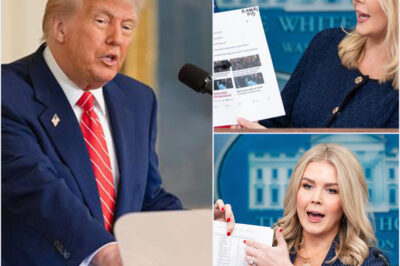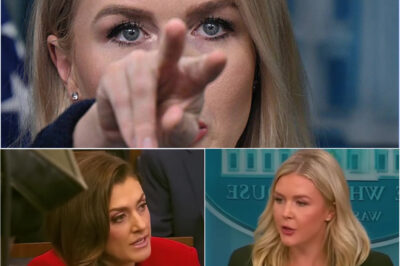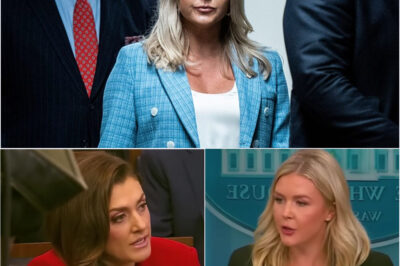Karoline Leavitt’s Influencer-Only Briefings Turn the White House Into a Stage for MAGA Theater
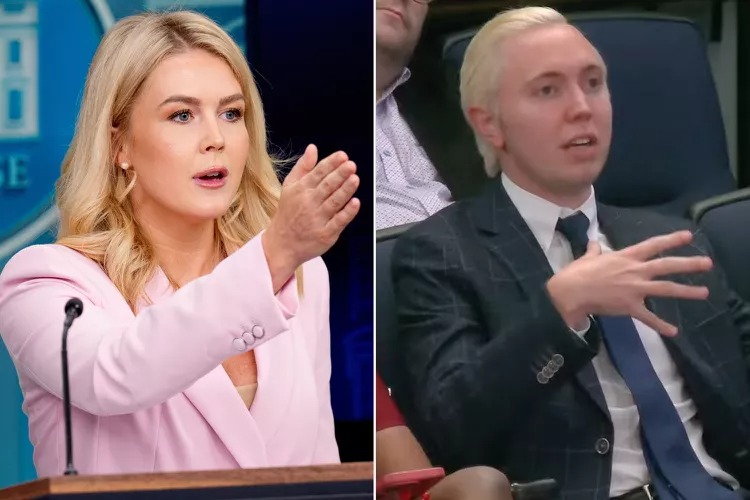
It wasn’t the usual press corps. There were no seasoned reporters from Reuters or the Associated Press. No tough policy questions. No follow-ups. Just applause, adoration, and viral video moments waiting to happen.
On April 28, White House Press Secretary Karoline Leavitt walked into the Brady Press Briefing Room not to face journalists, but to host a new kind of political performance. It was the first of what the Trump administration has branded “new media briefings” — a series of made-for-social-media events attended almost exclusively by pro-Trump internet influencers, many of whom have no journalism background and even less interest in accountability.
What followed wasn’t journalism. It was curated content for the MAGA ecosystem — a closed loop of praise, posturing, and soundbites. And it revealed something far deeper than a shift in communications strategy. It showed a White House willing to redefine reality, not just for the press, but for the country.
A Briefing Without Journalism
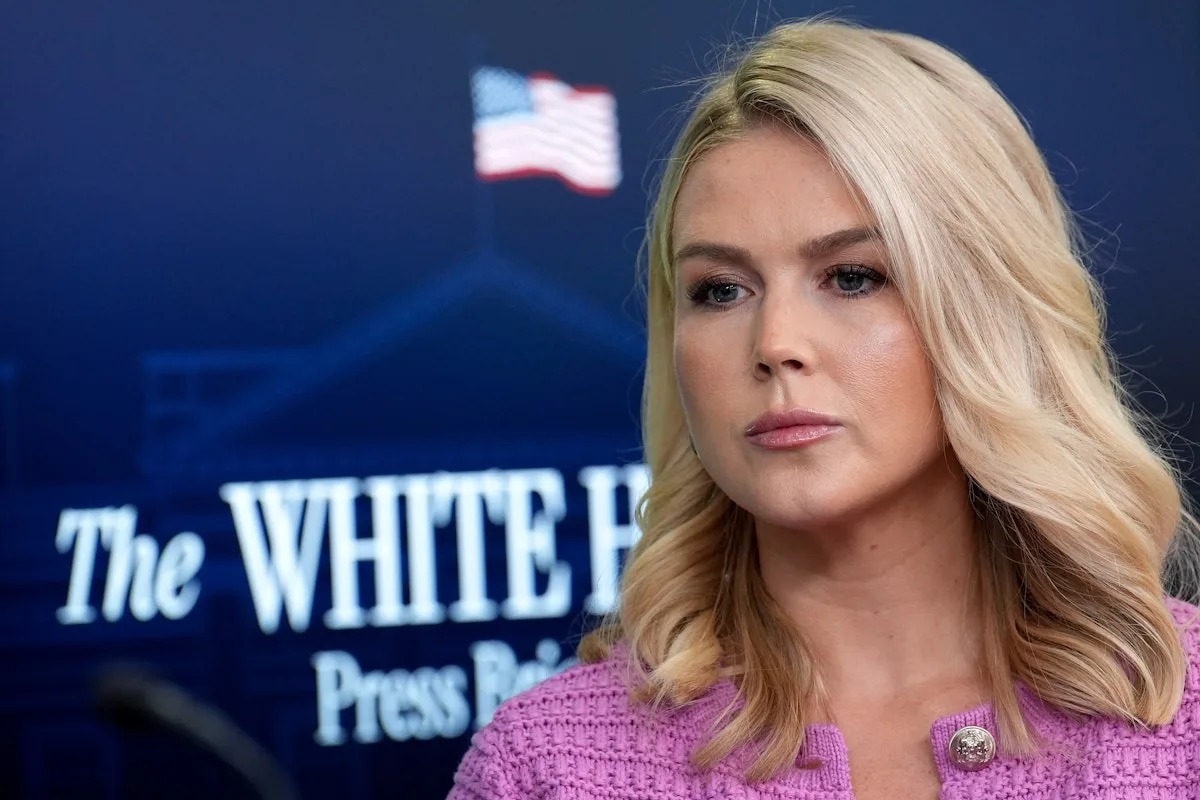
The announcement was simple but revealing.
“This is our first influencer briefing,” Leavitt told the room.
And with that, the event began — not with fact-finding, but with flattery.
The first question went to Arynne Wexler, a far-right social media personality whose idea of a lead-in was a compliment about Trump’s immigration crackdown. She closed her statement with a now-viral quip: “My Uber drivers finally speak English again.”
There was no pushback. No clarification. No fact check.
Because in this room, none was needed.
Enter “MAGA Malfoy” — and the Viral Machine
Perhaps the most surreal moment came when Link Lauren — a former RFK Jr. adviser turned Trump devotee — stepped up to the mic.
Known online as “MAGA Malfoy” for his bleach-blond hair and TikTok theatrics, Lauren bypassed policy altogether. Instead, he gushed over Leavitt’s ability to “juggle everything beautifully as a high-profile young mother,” and then launched into a tirade against the Biden years.
He described the White House under Biden as a “cesspool,” filled with “topless trans people on the lawn,” “cocaine everywhere,” and “Jill Biden’s self-tanner ruining every chair in the Oval.”
The line was clearly meant for social media. And it worked.
His TikTok video, filmed immediately after from the White House lawn, had already racked up hundreds of thousands of views by the next morning.
Behind the Optics: The Real Agenda
While the absurdity of the briefing was easy to mock, the implications were harder to dismiss.
This wasn’t just about giving a few MAGA influencers a photo op. It was about replacing the institutional press with a loyalist pipeline — one that never challenges power, never questions narrative, and always stays on script.
In fact, the influencer event came just two weeks after the White House revoked Associated Press access from daily press pool coverage — a move widely condemned by media organizations across the political spectrum.
The official reason? The AP refused to refer to the Gulf of Mexico as the “Gulf of America” in its coverage.
That was the warning shot.
The influencer briefing was the confirmation.
When the Only Questions Are Praises
The tone of the entire event was not just favorable — it was fawning.
Influencers lavished praise not only on Trump but on Leavitt herself. One attendee asked whether she found it difficult to be “so well-dressed and competent in a male-dominated world.”
Even when slightly more substantive questions emerged — such as a query about the long-sealed Jeffrey Epstein files — they were left hanging.
When Leavitt sidestepped the Epstein question with a generic statement about Attorney General Pam Bondi being a “bulldog,” no follow-up came.
The influencer simply nodded.
This is what happens when access is traded for compliance.
Floating the “Trump 2028” Trial Balloon
Perhaps the most alarming moment came near the end of the briefing, when Leavitt referenced the possibility of Trump’s executive actions being preserved beyond the next term.
“We’re working to ensure the president’s executive actions can remain long after his tenure,” she said, “so you don’t have another president coming in here in eight years and undo some of the work.”
Eight years.
The Constitution limits the presidency to two terms. But the Trump administration has made increasingly open gestures toward dismantling that norm. Last month, the Trump campaign began selling “Trump 2028” hats. And in a recent interview, Steve Bannon confirmed he is “working on” legal theories to support a third term.
Leavitt didn’t walk it back.
She emphasized it.
Democrats Respond: “This Isn’t Outreach — It’s Propaganda”
The reaction from Democratic officials was swift.
“This isn’t media inclusion. It’s media substitution,” said Representative Jamie Raskin. “We’ve gone from adversarial journalism to state-sponsored sycophancy.”
Senator Amy Klobuchar echoed the concern. “What the administration is doing here is dangerous. They are creating a parallel information ecosystem where no questions are ever hard, no facts are ever inconvenient, and no lies are ever called out.”
Former White House Press Secretary Jen Psaki, now a media contributor, simply tweeted:
“This isn’t a briefing. It’s a marketing campaign.”
The Risk of Normalizing the Absurd
For many Americans, it would be easy to laugh off the spectacle. MAGA influencers asking leading questions, praising Trump’s fitness regimen, or calling Biden’s lawn “a crime scene.”
But as political historian Ruth Ben-Ghiat warns, this is how normalization works.
“You repeat the ridiculous long enough, and eventually, it becomes the new standard,” she said. “You stop noticing that journalists aren’t in the room anymore. You stop asking why real questions never get answered. And suddenly, democracy becomes a stage.”
What Happens When a Real Crisis Hits?
Beyond the partisanship, the influencer briefing raises one urgent question: what happens when the White House needs to speak to the nation during a real crisis?
A pandemic. A military escalation. A natural disaster.
If the press room is filled with YouTubers and TikTokers asking about self-tanner and memes, will the American public get the answers it needs?
Or will it get 15-second soundbites wrapped in filters and hashtags?
Final Word: The Show Must Not Go On
Karoline Leavitt’s influencer briefing was marketed as innovation.
What it delivered was erosion — of standards, of transparency, and of the basic expectation that the most powerful office in the world should still answer to the people.
Not just the fans.
Not just the followers.
And certainly not to a room of clout-chasing sycophants with ring lights and brand deals.
For all the flags and slogans, democracy does not run on engagement metrics.
It runs on accountability.
And no filter can hide when that disappears.
News
Peacemaker in Chief: Leavitt Unveils Trump’s Bold First Six‑Month Climb Behind the confident rhetoric and bold maneuvers lies a story that’s only just beginning—prepare to be taken on a journey of strategy and impact.
“Peacemaker in Chief”: Leavitt Frames Trump’s First Six Months as Historic Wins WASHINGTON, D.C. – July 14, 2025 – In…
Karoline Leavitt Just Won an $800 Million Lawsuit Against The View—And It May Have Just Redefined the Boundaries of Live Television
Karoline Leavitt Just Won an $800 Million Lawsuit Against The View—And It May Have Just Redefined the Boundaries of Live…
Karoline Leavitt Shuts Down Critics with One Sentence — A Masterclass in Political Rhetoric Karoline Leavitt let the question finish, then silenced her critics with one precise sentence. No shouting, no drama — just pure political mastery. FULL STORY BELOW👇
“Karoline Let Her Finish, Then Crushed Her With One Sentence” In a test of political finesse, Karoline Leavitt once…
Karoline Leavitt’s Political Rhetoric SHATTERED in One Sentence — And Democrats Are Taking No Prisoners
“Karoline Leavitt’s Political Games Won’t Save Her From the Truth” In the fast-paced world of American politics, Karoline Leavitt has…
“ARE YOU KIDDING ME?” Caitlin Clark Held Back After Fiery Confrontation with Referee — And What Happened Next Left Fans in Shock
“ARE YOU KIDDING ME?” Caitlin Clark Held Back After Fiery Confrontation with Referee — And What Happened Next Left Fans…
Behind the Scenes at CBS: Lesley Stahl’s Silent Stand and the Unraveling Nobody Saw Coming
It didn’t happen on the air. There were no fireworks during the broadcast. No raised voices. No awkward moments caught…
End of content
No more pages to load

